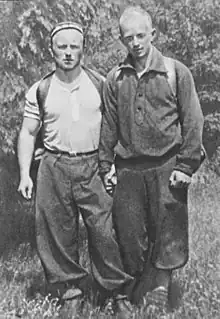Vitaly Abalakov
Vitaly Mikhaylovich Abalakov (Russian: Вита́лий Миха́йлович Абала́ков) (13 January [O.S. 31 December] 1906 – 26 May 1986[1]) was a Soviet chemical engineer, mountaineer and inventor.
Vitaly Mikhaylovich Abalakov | |
|---|---|
 Vitaly (right) with his brother Yevgeniy, 1920s | |
| Born | 13 January 1906 |
| Died | 26 May 1986 (aged 80) |
| Alma mater | D. Mendeleev University of Chemical Technology of Russia |
| Occupation(s) | chemical engineer, mountaineer and inventor |
Brother of Yevgeniy Abalakov, another famous alpinist, he made the first Soviet ascent of Lenin Peak in 1934 and two more ascents of this mountain. In 1936 he also made the ascent of Khan Tengri, where he lost several fingers and part of his foot.[2]
In 1938, he and others from his team were arrested by NKVD and were under investigation until 1940. He was accused of "open public propaganda" of western mountaineering techniques and "diminishing" domestic alpinists' achievements and being a "German spy".[3]
Abalakov is credited with such inventions as camming devices in the 1930s, Abalakov thread (or V-thread) gearless ice climbing anchor, and many other climbing equipment innovations.[4][5]
Awards
- Order of Lenin (1957)
- Order of the Badge of Honour (1972)
- Honoured Master of Sports of the USSR (1943)
- Honoured Trainer of the USSR (1961)
See also
Bibliography
- (in Russian) Расстрельное время
References
- Great Russian Encyclopedia (2006), Moscow: Bol'shaya Rossiyskaya Enciklopediya Publisher, vol. 1, p. 9
- Royal Geographical Society, The Alpine Club (2011). Mountaineers. Dorling Kindersley Ltd. p. 240. ISBN 978-1-409-38331-4.
- "Расстрельное время". Retrieved 2023-01-24.
- Matt Samet (2011). The Climbing Dictionary: Mountaineering Slang, Terms, Neologisms & Lingo: An Illustrated Reference. The Mountaineers Books. p. 44. ISBN 978-1-594-85503-0.
- Расстрельное время